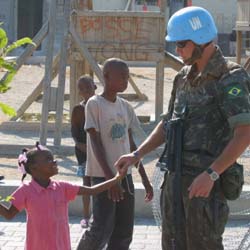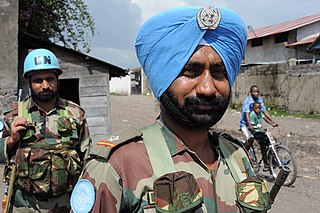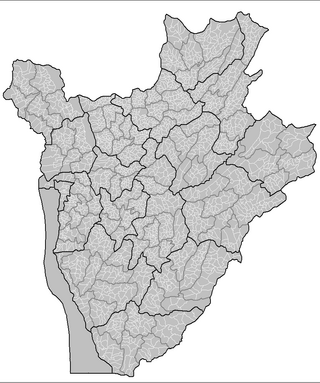
The United Nations Stabilisation Mission in Haiti, also known as MINUSTAH, an acronym of its French name, was a UN peacekeeping mission in Haiti from 2004 to 2017. It was composed of 2,366 military personnel and 2,533 police, supported by international civilian personnel, a local civilian staff, and United Nations Volunteers. The mission's military component was led by the Brazilian Army and commanded by a Brazilian.
The United Nations Mission in Haiti (UNMIH) was a peacekeeping operation carried out by the United Nations between September 1993 and June 1996. The Mission was reestablished (MINUSTAH) in April 2004, after a rebellion took over most of Haiti and President Bertrand Aristide resigned. This mandate ended in 2017, replaced by United Nations Mission for Justice Support in Haiti (MINUJUSTH), which saw the end of UN peacekeepers in Haiti after its ending in 2019.

United Nations Security Council Resolution 1542, adopted unanimously on 30 April 2004, after receiving a report by the Secretary-General Kofi Annan, the council deplored all violations of human rights in Haiti and urged the Government of Haiti to promote and protect human rights with a State based on rule of law and independent judiciary.

United Nations Security Council Resolution 1927, adopted unanimously on June 4, 2010, after recalling previous resolutions on Haiti, including resolutions 1542 (2004), 1576 (2004), 1608 (2005), 1658 (2006), 1702 (2006), 1743 (2006), 1780 (2007), 1840 (2008), 1892 (2009) and 1908 (2010), the Council authorised an additional deployment of 680 police as part of the United Nations Stabilization Mission in Haiti (MINUSTAH).

United Nations Security Council resolution 1536, adopted unanimously on 26 March 2004, after reaffirming all resolutions on the situation in Afghanistan, particularly Resolution 1471 (2003), the council extended the mandate of the United Nations Assistance Mission in Afghanistan (UNAMA) for an additional period of twelve months until 26 March 2005.

United Nations Security Council Resolution 1944, adopted unanimously on October 14, 2010, after recalling previous resolutions on Haiti, including resolutions 1542 (2004), 1576 (2004), 1608 (2005), 1658 (2006), 1702 (2006), 1743 (2006), 1780 (2007), 1840 (2008), 1892 (2009), 1908 (2010) and 1927 (2010), the Council renewed the mandate of the United Nations Stabilization Mission in Haiti (MINUSTAH) until October 15, 2011.

United Nations Security Council resolution 1565, adopted unanimously on 1 October 2004 after recalling all previous resolutions on the situation in the Democratic Republic of the Congo, extended the mandate of the United Nations Mission in the Democratic Republic of Congo (MONUC) until 31 March 2005 and authorised an additional deployment of 5,900 troops and police. It reaffirmed the commitment to respect the “sovereignty, territorial integrity and political independence [sic]” of Congo and States in the region.

United Nations Security Council Resolution 1576, adopted unanimously on 29 November 2004, after recalling resolutions 1529 (2004) and 1542 (2004) on the situation in Haiti, the Council extended the mandate of the United Nations Stabilisation Mission in Haiti (MINUSTAH) until 1 June 2005.

United Nations Security Council Resolution 1601, adopted unanimously on 31 May 2005, after recalling resolutions 1529 (2004), 1542 (2004) and 1576 (2004) on the situation in Haiti, the Council extended the mandate of the United Nations Stabilisation Mission in Haiti (MINUSTAH) until 24 June 2005.

United Nations Security Council resolution 1602, adopted unanimously on 31 May 2005, after recalling resolutions 1545 (2004), 1565 (2004), 1577 (2004) and 1596 (2005) on the situation in Burundi, the Council extended the mandate of the United Nations Operation in Burundi (ONUB) for a period of six months until 1 December 2005.

United Nations Security Council Resolution 1608, adopted unanimously on 22 June 2005, after recalling resolutions 1542 (2004) and 1576 (2004) on the situation in Haiti, the Council extended the mandate of the United Nations Stabilisation Mission in Haiti (MINUSTAH) until 15 February 2006 and increased its strength.

United Nations Security Council resolution 1635, adopted unanimously on 28 October 2005, after recalling all previous resolutions on the situation in the Democratic Republic of the Congo, including resolutions 1565 (2004), 1592 (2005), 1596 (2005), 1621 (2005) and 1628 (2005), the Council extended the mandate of the United Nations Mission in the Democratic Republic of Congo (MONUC) until 30 September 2006.

United Nations Security Council Resolution 1650, adopted unanimously on 21 December 2005, after recalling Resolution 1545 (2004) regarding the situation in Burundi, the Council extended the mandate of the United Nations Operation in Burundi (ONUB) until 1 July 2006.

United Nations Security Council Resolution 1658, adopted unanimously on February 14, 2006, after recalling resolutions 1542 (2004), 1576 (2004) and 1608 (2005) on the situation in Haiti, the Council extended the mandate of the United Nations Stabilisation Mission in Haiti (MINUSTAH) until August 15, 2006.

United Nations Security Council Resolution 1712, adopted unanimously on 29 September 2006, after recalling all previous resolutions on the situation in Liberia and West Africa, particularly resolutions 1509 (2003), 1667 (2006) and 1694 (2006), the Council extended the mandate of the United Nations Mission in Liberia (UNMIL) for six months until 31 March 2007.

United Nations Security Council Resolution 1734, adopted unanimously on December 22, 2006, after recalling all previous resolutions on the situation in Sierra Leone, including resolutions 1620 (2005) and 1688 (2006), the Council renewed the mandate of the United Nations Integrated Office in Sierra Leone (UNIOSIL) until December 31, 2007.
United Nations Security Council Resolution 1743 was unanimously adopted on 15 February 2007.

United Nations Security Council Resolution 1780 was unanimously adopted on 15 October 2007.
United Nations Security Council Resolution 1840 was unanimously adopted on 14 October 2008.

The United Nations Mission for Justice Support in Haiti (MINUJUSTH) was a peacekeeping mission in Haiti mandated by the United Nations Security Council through Resolutions 2350 (2017) and 2410 (2018). It was the successor to MINUSTAH.















